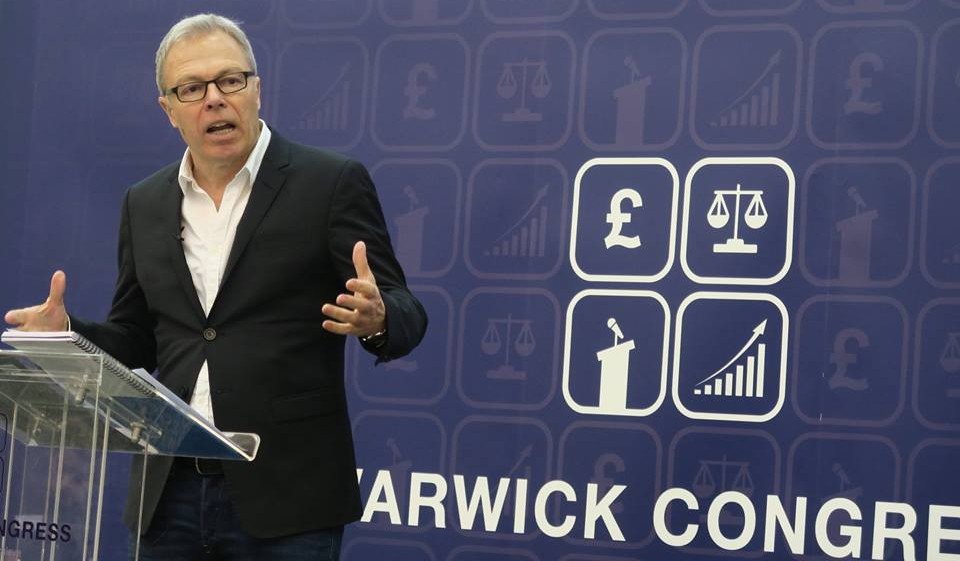Gavin Hewitt on Global Trade, Technology and Innovation
At Warwick Congress 2018, the BBC’s Head of News Gavin Hewitt addressed the issues of globalisation, technology and innovation and how the changes are interlinked in our integrated society. Quynh Luong and Alex Exact give their verdict on the headline speaker.
Drawing on globalisation and the technological revolution, Gavin Hewitt sets out to explain how recent change has created volatility in our politics, especially for those left behind by the benefits of our interconnected world. On the debate between protectionism and free trade in the modern economy, he identifies a populist shift towards protectionism in developed countries as problems have emerged following globalisation. Hewitt starts with the example of America and how Trump’s protectionist policies have successfully won the hearts of many American voters.
Globalisation has created a world of winners and losers, an arena where competing countries fight for advantage and there is no room for a global community. The reason why an overwhelming amount of people voted for Trump, he says, was because of his appeal to those that felt ignored. He was able to capture the outrage from the Americans who felt that their jobs were taken from them by immigrants and he used the outrage as a political weapon. Trump painted America as a land being ripped off by ‘global power structures’ and large international corporations, and linked it directly to globalisation. Hewitt notes how Trump’s inaugural speech differed from previous presidential speeches as he referred not once to ‘liberty’ or ‘freedom’ but instead, catered to the nationalist cry for ‘America First’.
“Globalisation is no longer a choice, but a reality…”
Although many Americans feel that they have fallen victim to the ‘conspiracy’ of globalisation, Hewitt highlights that the benefits still outweigh the costs. This is proven by Chinese President Xi’s defence of globalisation and free trade at the World Economic Forum in Davos, despite China being a traditionally protectionist state. “No one will emerge as a winner in a trade war”, he remarked. Globalisation has managed to eradicate poverty and reduce inequality all around the world. Hewitt emphasises the importance of acknowledging how “globalisation is no longer a choice, but a reality”. Rather than fighting against it, we should embrace the reality of it, as China has: “The global economy is the big ocean you cannot escape from, and China has learned how to swim”.
It has been easy for populists to point the finger at globalisation for the migration of jobs from developed countries, argues Hewitt. But globalisation is merely the facilitator, he suggests. The crux of the issue is innovation, which just so happens to be the theme of Warwick Congress 2018.
“Innovation could jeopardise 38% of jobs…”
Statistics are deployed. Innovation could jeopardise 38% of jobs, Hewitt says. No one in the audience quite understands how the figure was arrived at, or even whether such a statistic is calculable for that matter, but it has an impact all the same. Clearly Hewitt has a point; competitive advantage is what will make or break the economies of the future, and putting up trade barriers will not be enough to save those who cannot keep up with the pace of change. Technology will redefine jobs and reshape our institutions and society, but it may inevitably create a deep sense of isolation as the discovery of machine learning and artificial intelligence makes the human effort redundant. With these remarks, I get the impression that the journalist has not merely made an observation, but also struck something of a raw nerve with the audience.
The delegates here are well educated, ambitious and engaged. Yet they are all acutely aware that these traits may count for nothing if technology continues to race ahead, displacing even the most committed of graduates. Hewitt cites the rollout of the electric car as an example of the threat innovation poses to skilled jobs. It requires far fewer parts than a petrol equivalent, and many parts are actually less complex. What will be the impact on the 13 million associated jobs in Europe alone?
“That millions of people can be mobilised by social media in a matter of hours is testament to a new age in democracy…”
The headline speaker, however, is ‘wary of the prophets of doom’ and strikes a more optimistic tone. History teaches us that economies, and the workers within them, adapt. Before the industrial revolution, he points out, the vast majority of people were farmers. That is now a tiny percentage of the workforce, and most of today’s jobs didn’t exist until recent times.
Furthermore, Hewitt emphasises that change can be positive and points to the women’s march following Trump’s victory. That millions of people can be mobilised by social media in a matter of hours is testament to a new age in democracy. He looks to the technological possibilities future, in which we could have our health monitored on a mobile app. Innovation has invaded not just the public sphere but our private lives as well. There will be winners and losers, and pros and cons. But if Gavin Hewitt has proved one thing to his audience at Congress, it is that change is well underway, and that it is unstoppable.

Comments